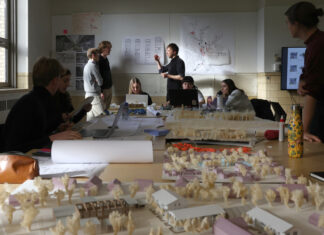With the blockade of Ukrainian ports, Russia is escalating the global food crisis. The Kremlin deliberately prevents the supply of grain, using hunger as a geopolitical strategy. Putin also hopes that this will increase the flow of refugees to Europe.
Russia has radically exacerbated a food crisis; but there was a crisis in this sector and sharply rising food prices before that. The aggravation of the situation was caused by Russian military attacks on Ukrainian granaries, but above all by the blockade of ship exports from the ports of Odessa and Južne.
Odessa has always been the main transshipment point for Ukrainian grain. However, the export via Odessa is currently also being made impossible by the Ukraine, which has mined the port catchment area to protect itself from a Russian maritime attack on the city.
Now save articles for later in “Pocket”.
Ukraine does not want to eliminate the mine belt. This is understandable, because it would significantly increase the risk of danger from the Russian Navy for the Odessa region. But if the mine belt stays in place, exports will be difficult, even if Russia, which is unlikely, agrees to free shipping transit.
Russia has begun illegally shipping Ukrainian grain through the ports of Berdyansk and Mariupol, both of which are under Russian military control. But most recently, Turkey stopped a freighter loaded with Ukrainian grain. This points to a dilemma: Of course, Russia shouldn’t also be allowed to make money from stolen Ukrainian grain. On the other hand, every delayed freighter causes a worsening of the global grain supply.
At the same time, Russia has kept some of its own grain out of the world market. The aim was to drive up grain prices and fuel inflation in the western states. The Russian leadership expects this to wear down the Western population and put pressure on their governments to stop supporting Ukraine. However, inflation does not only affect Western countries, but many poor countries in the world. In many of these states, this will shake social and then political stability.
As early as 2010/11, a food supply crisis sparked rebellions in North African and Middle Eastern Arab states. Crises in this region are interesting for Russia, as they could significantly increase the refugee pressure on the EU.
The flow of refugees caused by climate change would intensify into a flow of refugees from the hunger crisis. However, this would also make it clear that the southern European states are much more interested in stability in North Africa and the Middle East than in ending the war in Ukraine.
Will Russia’s role in the global grain supply crisis grow into displeasure with Russia in the countries most affected by it?
In part yes. But the narrative promoted by Russia that the West has a share of responsibility because it turned a regional conflict into a global conflict is also being caught. The Russian measures are the result of Western sanctions.
Indian Prime Minister Modi recently said: “Europe is turning its problems into problems for the whole world. The problems of the world, however, are not regarded by the Europeans as their own”.
In some countries, Russia will also sell itself as the savior in an emergency by supplying particularly poor countries with Russian grain.
So it is right that Russia is using hunger as a weapon in the geopolitical struggle with the West. This is a serious crime. In terms of energy supply, too, Russia is exploiting its European dependencies and is using the throttling of gas exports in retaliation for EU sanctions.
As reprehensible as Russia’s behavior is, it must have been clear to all actors from the start that Russia would retaliate against the Western sanctions. Economics Minister Habeck speaks of an “economic attack” by Russia on Europe. In Moscow, the EU sanctions are called an “economic lightning war” against Russia. In this dispute, Russia is using all the weapons at its disposal.
Gerhard Mangott is a professor of political science with a special focus on international relations and security in the post-Soviet space. He teaches at the Institute for Political Science in Innsbruck and is a lecturer at the Diplomatic Academy in Vienna
















































